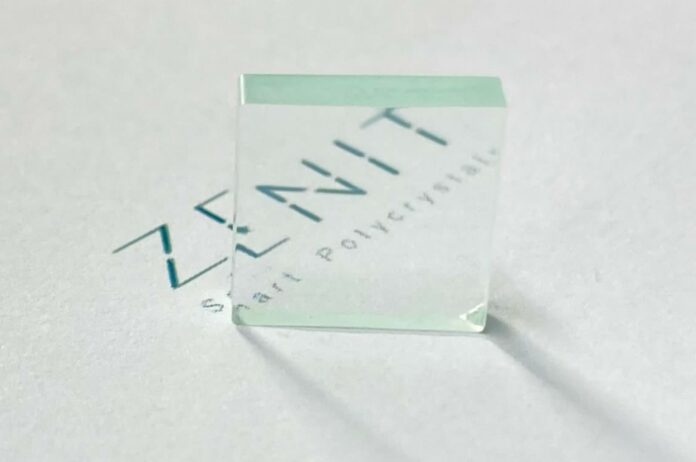A new partnership between ceramic 3D printing company Lithoz and Italian start-up ZENIT Smart Polycrystals will accelerate the go-to-market strategy of the latter’s patented polycrystal components for solid-state lasers.
ZENIT ambitions to develop transparent YAG polycrystals (Y3Al5O12, yttrium aluminium garnet) with homogeneous or multiple doping and with simple or complex shapes, which can replace traditional and less performing single crystals in different markets. Put simply, this solution will enhance applications for medical lasers, automotive, lighting and scintillation detectors.
The partnership with Lithoz is said to be 360° because the Austrian machine manufacturer will support the ZENIT team on a technical level in aligning ZENIT’s process to the LCM 3D printing technology and will share its expertise as both a spin-off and start-up in a highly innovative and dynamic market environment – a market that requires a thoughtful mastery of innovation strategy, market analysis, licensing and structural organization, all of which Lithoz has built extensive expertise in.
“Having been working in research and industry for more than 10 years, it is fantastic to see how our industry is growing and being seen as one of the top markets to watch. Partnerships are one of our most important values at Lithoz and we invite any innovator looking for support in a challenging project to collaborate with us – we work together with our partners to overcome even the most difficult of technological challenges and to make the future of ceramics happen already today”, Lithoz CEO Dr. Johannes Homa states about this partnership.
The LCM technology and the transparent polycrystal components with chemically variable composition
As a reminder, the proprietary lithography-based ceramic manufacturing process is a fabrication process where ceramic particles are dispersed in a photosensitive resin and this dispersion is thereafter solidified by light layer-by-layer to form a part. Then the part undergoes a sintering process to develop its ceramic properties and can be used for its final purpose.
As part of this project, the company explains that the 3D printed parts feature varying three-dimensional compositions, creating an improved polycrystal material which clearly outperforms the current dominant laser-based technology. Lithoz’ technology enables therefore, equal or superior material properties as those of components produced using conventional forming methods. These smart components can be made even more efficiently to improve performance and open the door to a new generation of exciting new projects, a press release explains.
Remember? Two years ago, Lithoz celebrated its 10th year anniversary. As I told you, when a company develops a quality product, you’ll find out eventually without asking or looking for it but you do not develop a great product without a solid structure and a team that makes this vision a reality. That’s the reason why, for this partnership, I am ready to take Lithoz’ words for it.
ZENIT is currently in a 12-month Proof of Concept phase, preliminary to market entry, that will end at the beginning of 2023.
Remember, you can post jobopportunities in the AM Industry on 3D ADEPT Media free of charge or look for a job via our job board. Make sure to follow us on our social networks and subscribe to our weekly newsletter : Facebook, Twitter, LinkedIn & Instagram ! If you want to be featured in the next issue of our digital magazine or if you hear a story that needs to be heard, make sure to send it to contact@3dadept.com






